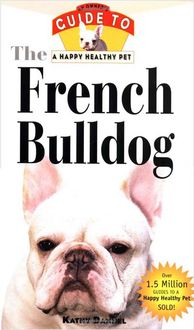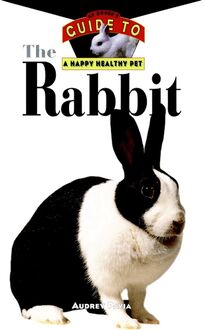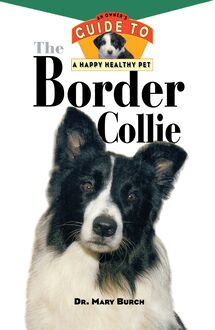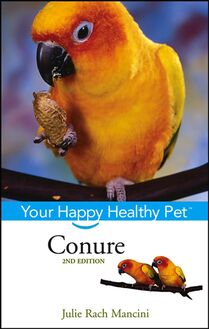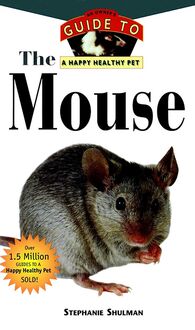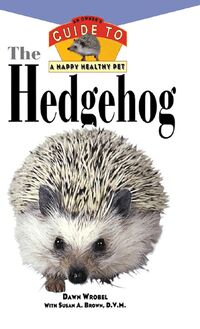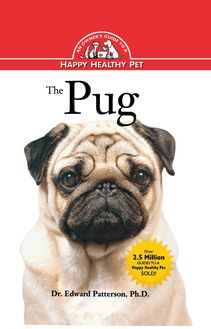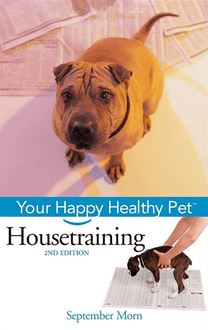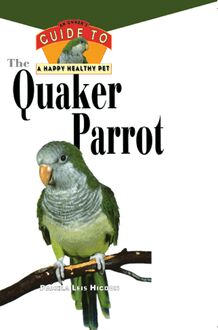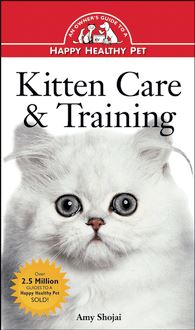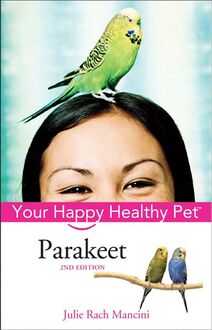First Aid For Birds , livre ebook
82
pages
English
Ebooks
2008
Vous pourrez modifier la taille du texte de cet ouvrage
Obtenez un accès à la bibliothèque pour le consulter en ligne En savoir plus
Découvre YouScribe et accède à tout notre catalogue !
Découvre YouScribe et accède à tout notre catalogue !
82
pages
English
Ebooks
2008
Vous pourrez modifier la taille du texte de cet ouvrage
Obtenez un accès à la bibliothèque pour le consulter en ligne En savoir plus
Publié par
Date de parution
05 mai 2008
EAN13
9780470368596
Langue
English
Poids de l'ouvrage
1 Mo
PART ONE: First Aid for Pet Birds.
1. What Is First Aid?
2. First Aid Procedures.
3. Home Care for Recuperating Birds.
PART TWO: Preventive Care.
4. Your Bird's Nutrition.
5. Household Hazards.
6. Reducing Your Pet's Stress.
7. Observing Your Pet Bird Daily.
8. Pet Bird Grooming.
9. Your Avian Veterinarian.
PART THREE: Beyond the Basics.
10. Resources.
Publié par
Date de parution
05 mai 2008
EAN13
9780470368596
Langue
English
Poids de l'ouvrage
1 Mo
First Aid for Birds
Howell Book House
Howell Book House
A Simon Schuster Macmillan Company
1633 Broadway
New York, NY 10019
Copyright 1999 by Howell Book House
All rights reserved. No part of this book may be reproduced or transmitted in any form or by any means, electronic or mechanical, including photocopying, recording or by any information storage or retrieval system, without permission in writing from the Publisher.
MACMILLAN is a registered trademark of Macmillan, Inc.
Library of Congress Cataloging-in Publication Data
Rach, Julie.
First aid for birds: an owner s guide to a happy, healthy pet / by Julie Rach with Gary A. Gallerstein.
p. cm.
Includes bibliographical references.
ISBN: 0-87605-531-5
1. Cage birds-Wounds and injuries-Treatment. 2. Cage birds-Diseases-Treatment. 3. Veterinary emergencies. 4. First aid for animals. I. Gallerstein, Gary A., 1952- . II. Title.
SF994.R335 1998
636.6 8-dc21 98-34642
CIP
Manufactured in the United States of America
10 9 8 7 6 5 4 3 2 1
Series Director: Amanda Pisani
Assistant Series Director: Jennifer Liberts
Book Design: Michele Laseau
Cover Design: Iris Jeromnimon
Illustration: Ryan Oldfather
Photography:
Front cover, front cover inset and back cover: Eric Ilasenko
Joan Balzarini: i, 34, 70-71, 76, 80, 117
Gary A. Gallerstein, DVM: 26, 37, 39, 48
Sherry Lee Harris: 12, 15, 20, 24, 57, 63, 73, 79, 82, 97, 104, 119
Eric Ilasenko: 2-3, 5, 7,11,16,18, 23, 42, 55, 59, 61, 68, 72, 75, 78, 81, 85, 88, 89, 92,94, 95,96, 98,99,103, 106,109,110, 111, 114,116, 122
Julie A. Rach: 19
Bob Schwartz: 13, 65, 83
Production Team: Carrie Allen, Clint Lahnen, Stephanie Mohler, Dennis Sheehan, Terri Sheehan
Contents
part one
First Aid for Pet Birds
1 What Is First Aid?
2 First Aid Procedures
3 Home Care for Recuperating Birds
part two
Preventive Care
4 Your Bird s Nutrition
5 Household Hazards
6 Reducing Your Pet s Stress
7 Observing Your Pet Bird Daily
8 Pet Bird Grooming
9 Your Avian Veterinarian
part three
Beyond the Basics
10 Resources
part one
Chapter 1
What is First Aid?
First aid is defined as the initial treatment given to an injured or sick animal while waiting for qualified veterinary treatment. In some cases of minor injury, birds need only to receive first aid at home, while in other cases, first aid is the first step in treating a serious injury or illness. It cannot be viewed as a substitute for qualified avian veterinary care.
This book is divided into two parts: The first is designed to provide you with first aid information to help you care for your feathered friend when he needs you the most, while the second is meant to help you prevent as many accidents and illnesses as possible.
What Constitutes an Emergency?
A medical emergency is a serious and/or potentially life-threatening injury or disease that requires immediate care. In some instances, such as bleeding, first aid at home may actually be the best first course of action. In addition to any home care, you should contact your avian veterinarian s office immediately in emergency situations for follow-up instructions.
Here are some guidelines from veterinarian Tim Hawcroft on when to call your avian veterinarian:
Call immediately when:
your bird doesn t stop bleeding
your bird has blood in droppings or in regurgitated food
your bird has extensive burns
your bird has collapsed or can t maintain his balance
your bird has been poisoned
your bird has a puncture wound or deep cut
your bird cannot breathe
your bird is straining to pass a dropping or an egg
Call the same day when:
your bird has lost his appetite
your bird has an eye injury
your bird has swallowed a foreign object
your bird has low body temperature
your bird is mutilating his skin
your bird has loose droppings
your bird develops a sudden swelling on his body
Call the next day when:
your bird is excessively thirsty
your bird seems to have itchy skin
Bird owners are frequently unsure if a problem is truly an emergency. The best remedy is to follow your instincts and use good common sense. If there s any doubt in your mind regarding the severity of your bird s condition, it s best to treat it as an emergency!
Record Normal Appearance and Behavior
One of the best ways to detect an emergency situation in your pet bird is to know what is considered normal for your bird. Be aware of how much food he eats and how much water he drinks on a regular basis. Know how many times he eliminates in a day and what a normal dropping looks like for your bird. Pay attention to his activity level and his sleeping times.
If your bird is damaging his skin, he should be seen by the veterinarian the same day the condition is noticed.
When you are attuned to your bird s normal behavior, you ll notice anything abnormal or unusual right away. In time, you ll even begin to sense when something isn t right about your bird s appearance or behavior, even when the changes are subtle. Listen to that nagging little voice in the back of your head-if something doesn t seem right about your bird, call your avian veterinarian s office for an appointment. Let your avian veterinarian know about any changes in your pet s routine as soon as you notice it so follow-up care, such as a physical examination to rule out injury or illness, can take place promptly.
A Pet Bird First Aid Kit
Before we address the specific techniques, we d like to suggest that you assemble a bird owner s first aid kit so that you will have some basic supplies on hand before your bird needs them. Here s what to include:
appropriate-sized towels for catching and holding your bird
a heating pad, heat lamp or other heat source
a pad of paper and pencil to make notes about your bird s condition
address and phone number of your avian veterinarian s office, along with address and phone number of your closest animal emergency hospital
styptic powder, silver nitrate stick or cornstarch to stop bleeding (use styptic powder and silver nitrate stick on beak and nails only)
blunt-tipped scissors
nail clippers and nail file
needle-nosed pliers (to pull broken blood feathers)
blunt-end tweezers
hydrogen peroxide or other disinfectant solution
eye irrigation solution, such as a saline solution or wetting solution for contact lenses
basic bandage materials such as gauze squares, masking tape (it doesn t stick to a bird s feathers like adhesive tape) and gauze rolls
Pedialyte or other energy supplement, such as orange juice or Gatorade
eye dropper
syringes to irrigate wounds or feed sick birds
penlight
cotton swabs to apply medication and clean wounds
Betadine soap, which is an anti-infective soap, for foot injuries
Betadine solution for open wounds (use this under veterinary advice only)
Keep all these supplies in one place, such as a fishing tackle box. This will eliminate having to search for some supplies in emergency situations, and the case can be taken along to bird shows, on trips or left for the bird-sitter if your bird isn t an adventurer.
First Aid Priorities
In an emergency situation, try to keep calm and work in an orderly process. You should first determine whether the injury or illness is life-threatening. If there are multiple injuries, prioritize your efforts according to the severity of each injury.
L IFE -T HREATENING I NJURIES OR I LLNESSES
Severe bleeding or blood flowing freely from a wound must be attended to immediately. Treat such life-threatening injuries or illnesses by administering first aid without delay and then calling the veterinarian.
N ON -L IFE -T HREATENING I NJURIES OR I LLNESSES
Injuries or illnesses that are causing distress or pain but are not life-threatening, such as fractures, diarrhea or vomiting, should be treated next. You should be preventing the injury or illness from worsening and preparing the bird for transportation to the veterinarian.
SIGNS OF ILLNESS
Some signs of illness in pet birds include:
a fluffed-up appearance
a loss of appetite
sleeping all the time
a change in the appearance or number of droppings
weight loss
listlessness
drooping wings
lameness
partially eaten food stuck to the bird s face or food has been regurgitated onto the cage floor
labored breathing, with or without tail bobbing
runny eyes or nose
not talking or singing
If your bird shows any of these signs, please contact your veterinarian s office immediately for further instructions. Your bird should be seen as soon as possible to rule out any illnesses.
M INOR I NJURIES OR I LLNESSES
Injuries such as a superficial abrasion or minor cut come last in the order of priorities for treatment. Care for the bird at home if you know how to treat the condition. Take the bird to the veterinarian if the injury or illness does not improve or if the condition worsens.
Shock
Any emergency, severe insult to the body or excessive handling can result in shock. Common symptoms of shock include a depressed, weak, fluffed-up look and rapid shallow breathing. If a bird in shock is given intensive treatment and/or handling, the bird may collapse and die on the spot. In a life-threatening injury or illness, simultaneously treat the bird for shock and for the injury or illness.
Simply put, shock is the circulatory system s failure to supply adequate blood flow to meet the body s needs.
The treatment of lower priority (non-life-threatening) injuries and illnesses should be delayed if the bird is in shock.
Urgent Care Don ts
Don t give a bird medications for humans or medications prescribed for another animal unless so directed by your veterinarian.
Don t give your bird medications that are suggested by a friend, a store employee or a physician who treats humans.
Don t give a bird alcohol or laxatives.
Don t apply any oils or ointments to your bird unless your veterinarian tells you to do so.
Don t bathe a sick bird
